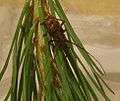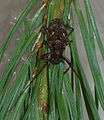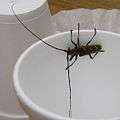Monochamus
| Monochamus | |
|---|---|
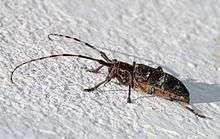 | |
| Monochamus galloprovincialis | |
| Scientific classification | |
| Kingdom: | Animalia |
| Phylum: | Arthropoda |
| Order: | Coleoptera |
| Family: | Cerambycidae |
| Subfamily: | Lamiinae |
| Tribe: | Lamiini |
| Genus: | Monochamus Dejean, 1821 |
| Species | |
|
Numerous, see text | |
Monochamus is a genus of longhorn beetles found throughout the world. They are commonly known as sawyer beetles or sawyers, as their larvae bore into dead or dying trees, especially conifers[1] such as pines. They are the type genus of the Monochamini, a tribe in the huge long-horned beetle subfamily Lamiinae, but typically included in the Lamiini today.
If sawyer beetles infect freshly cut pine logs, they can cause a 30–40% loss in value due to the tunnels their larvae bore. It's important to process logs within a few weeks of cutting or store them in water to minimize damage.[2] Some species are known to transport phoretic Bursaphelenchus nematodes, including B. xylophilus which causes pine wilt disease.[3]
Species
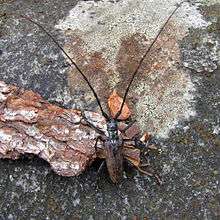
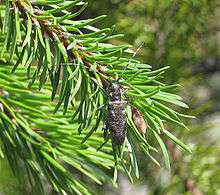
Listed alphabetically.[4]
- Monochamus alternatus Hope, 1842 – Japanese pine sawyer beetle
- Monochamus aurigutta Jordan, 1903
- Monochamus annobonae Aurivillius, 1928
- Monochamus accri (Dillon & Dillon, 1959)
- Monochamus aparus (Jordan, 1903)
- Monochamus alboapicalis (Pic, 1934)
- Monochamus asiaticus (Hayashi, 1962)
- Monochamus africanus Breuning, 1935
- Monochamus adamitus Thomson, 1857
- Monochamus alboscutellaris Breuning, 1977
- Monochamus basigranulatus Breuning, 1952
- Monochamus bimaculatus Gahan, 1888
- Monochamus binigricollis Breuning, 1965
- Monochamus bootangensis Breuning, 1947
- Monochamus buquetii (Thomson, 1858)
- Monochamus borussus Jordan, 1903
- Monochamus biplagiatus Breuning, 1935
- Monochamus benito (Dillon & Dillon, 1959)
- Monochamus balteatus Aurivillius, 1903
- Monochamus camerunensis Aurivillius, 1903
- Monochamus carolinensis (Olivier, 1792) – Carolina sawyer
- Monochamus centralis (Duvivier, 1891)
- Monochamus clamator (LeConte, 1852) – spotted pine sawyer
- Monochamus cribellum Jordan, 1903
- Monochamus cribrosus (Lameere, 1893)
- Monochamus conradti Breuning, 1961
- Monochamus convexicollis Gressitt, 1942
- Monochamus congoanus Breuning, 1935
- Monochamus dubius (Gahan, 1894)
- Monochamus dayremi Breuning, 1935
- Monochamus densepunctatus Breuning, 1980
- Monochamus distigma Jordan, 1903
- Monochamus fallax (Dillon & Dillon, 1959)
- Monochamus flavomarmoratus Breuning, 1935
- Monochamus fascioguttatus Gressitt, 1938
- Monochamus fisheri Breuning, 1944
- Monochamus flavosignatus Breuning, 1947
- Monochamus farinosus (Bates, 1884)
- Monochamus galloprovincialis (Olivier,1795) – black pine sawyer or timberman beetle
- Monochamus grandis Waterhouse, 1881
- Monochamus granulipennis Breuning, 1949
- Monochamus griseoplagiatus Thomson, 1858
- Monochamus guttulatus Gressitt, 1951
- Monochamus gravidus (Pascoe, 1858)
- Monochamus griseofasciatus Breuning, 1935
- Monochamus guerryi Pic, 1903
- Monochamus homoeus Jordan, 1903
- Monochamus impluviatus Motschulsky, 1859
- Monochamus irrorator (Chevrolat, 1855)
- Monochamus isochrous Jordan, 1903
- Monochamus itzingeri Breuning, 1935
- Monochamus inexpectatus Breuning, 1935
- Monochamus karlitzingeri Tavakilian & Jiroux, 2015
- Monochamus kinabaluensis Hüdepohl, 1996
- Monochamus kumageinsulanus Hayashi, 1962
- Monochamus leuconotus (Pascoe, 1869) - White Stem Borer of Coffee
- Monochamus lunifer (Aurivillius, 1891)
- Monochamus luteodispersus Pic, 1927
- Monochamus marmorator Kirby in Richardson, 1837 – balsam fir sawyer
- Monochamus maruokai Hayashi, 1962
- Monochamus mutator LeConte in Agassiz, 1850 – spotted pine sawyer
- Monochamus murinus (Gahan, 1888)
- Monochamus masaoi Kusama & Takakuwa, 1984
- Monochamus mausoni Breuning, 1950
- Monochamus melaleucus Jordan, 1903
- Monochamus marshalli Breuning, 1935
- Monochamus millegranus Bates, 1891
- Monochamus nitens Bates, 1884
- Monochamus notatus (Drury, 1773) – northeastern sawyer or notable sawyer[5]
- Monochamus nicoletii Thomson, 1857
- Monochamus nigromaculicollis Breuning, 1974
- Monochamus nigrovittatus Breuning, 1938
- Monochamus nigrobasimaculatus Breuning, 1981
- Monochamus obtusus Casey, 1891 – obtuse sawyer
- Monochamus ochraceomaculatus Breuning, 1935
- Monochamus ochreopunctatus Breuning, 1980
- Monochamus ochreosticticus Breuning, 1938
- Monochamus olivaceus Breuning, 1935
- Monochamus ogowensis (Dillon & Dillon, 1959)
- Monochamus omias Jordan, 1903
- Monochamus pseudotuberosus Breuning, 1936
- Monochamus plumbeus (Gahan, 1888)
- Monochamus pictor (Bates, 1884)
- Monochamus pauper (Kolbe, 1894)
- Monochamus pheretes (Dillon & Dillon, 1961)
- Monochamus quadriplagiatus Breuning, 1935
- Monochamus reticulatus (Dillon & Dillon, 1959)
- Monochamus ruficornis (Hintz, 1913)
- Monochamus ruspator (Fabricius, 1781)
- Monochamus regularis (Aurivillius, 1924)
- Monochamus rubigineus Fairmaire, 1892
- Monochamus saltuarius Gebler, 1830 – Sakhalin pine beetle
- Monochamus sartor (Fabricius, 1787)
- Monochamus scabiosus (Quedenfeldt, 1882)
- Monochamus scutellatus (Say, 1824) – white-spotted sawyer or spruce sawyer[6]
- Monochamus stuhlmanni Kolbe, 1894
- Monochamus sutor (Linnaeus, 1758) – pine sawyer
- Monochamus strandi Breuning, 1939
- Monochamus serratus (Gahan, 1906)
- Monochamus shembaganurensis Breuning, 1979
- Monochamus sparsutus Fairmaire, 1889
- Monochamus subfasciatus (Bates, 1873)
- Monochamus subtriangularis Breuning, 1971
- Monochamus spectabilis (Perroud, 1855)
- Monochamus titillator (Fabricius, 1775) – southern pine sawyer
- Monochamus tropicalis (Dillon & Dillon, 1961)
- Monochamus thomensis Jordan, 1903
- Monochamus talianus Pic, 1912
- Monochamus tonkinensis Breuning, 1935
- Monochamus tuberosus (Bates, 1884)
- Monochamus tridentatus Chevrolat, 1833
- Monochamus thomsoni (Chevrolat, 1855)
- Monochamus thoas (Dillon & Dillon, 1961)
- Monochamus triangularis Breuning, 1935
- Monochamus urussovi (Fischer von Waldheim,1806) – black fir sawyer
- Monochamus unicolor Breuning, 1939
- Monochamus verticalis (Fairmaire, 1901)
- Monochamus variegatus (Aurivillius, 1925)
- Monochamus variegator Aurivillius, 1907
- Monochamus vagus (Gahan, 1888)
- Monochamus x-fulvum Bates, 1884
Gallery
Three pictures of two separate sawyers found in a planting of Scots pines in Kansas.
References
- ↑ The Free Dictionary (TFD) (2008): Genus Monochamus. Retrieved 2009-MAR-23.
- ↑ Douglas Allen,”Sawyer Beetles”, New York Forest Owner, May 1994
- ↑ Kansas State University Extension Horticulture (KSU-EH) (2005): Pine Wilt. Version of 2005-FEB-28. Retrieved 2009-MAR-23.
- ↑ Monochamus, funet.fi
- ↑ John Acorn and Ian Sheldon. Bugs of Ontario. Edmonton, AB:Lone Pine Publ., 2003.
- ↑ Spruce Sawyer, Insects of Alberta
External links
 Media related to Monochamus at Wikimedia Commons
Media related to Monochamus at Wikimedia Commons Data related to Monochamus at Wikispecies
Data related to Monochamus at Wikispecies- Monochamus, BugGuide
- Ínsect vectors of the pinewood nematode
